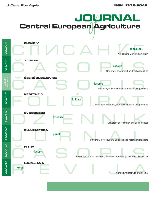
Journal of Central European Agriculture
Scope & Guideline
Exploring Agricultural Frontiers for a Sustainable Future
Introduction
Aims and Scopes
- Sustainable Agricultural Practices:
Research exploring methods to enhance sustainability in agriculture, including organic farming, crop rotation, and integrated pest management. - Soil and Crop Management:
Studies focused on soil health, nutrient management, and practices that optimize crop yield and quality. - Animal Husbandry and Welfare:
Investigations into livestock management, animal health, and welfare practices, including nutrition and breeding strategies. - Environmental Impact Assessments:
Research assessing the environmental effects of agricultural practices, including pesticide use, soil erosion, and biodiversity loss. - Innovative Agricultural Technologies:
Exploration of new technologies in agriculture, such as precision farming, biopesticides, and genetic engineering. - Food Security and Economic Viability:
Studies analyzing the economic aspects of agriculture, food production systems, and the socioeconomic factors influencing food security.
Trending and Emerging
- Climate Change Adaptation Strategies:
Increasing focus on studies that assess the impacts of climate change on agriculture and propose adaptive strategies to mitigate its effects. - Use of Biotechnology in Agriculture:
Emerging research into biotechnological applications, including genetic modifications and microbiome studies aimed at improving crop resilience and productivity. - Nutritional Quality of Agricultural Products:
A trend towards assessing the nutritional value of food products and their health implications, reflecting a growing consumer interest in food quality. - Agroecology and Biodiversity:
A rise in studies advocating for agroecological practices that promote biodiversity and ecosystem services within agricultural landscapes. - Innovative Waste Management Practices:
Emerging themes around the utilization of agricultural waste and by-products for sustainable practices, including bioenergy and soil amendments. - Digital Agriculture and Precision Farming:
Increased research on the integration of digital technologies and precision agriculture tools to enhance productivity and sustainability in farming.
Declining or Waning
- Traditional Crop Varieties:
Research focusing on traditional or heirloom crop varieties has decreased, possibly due to a shift towards genetically modified and high-yielding varieties that promise better economic returns. - Basic Soil Chemistry Studies:
Basic studies on soil chemistry and physical properties are becoming less frequent as the field moves towards more applied research focusing on soil health and bioremediation. - Conventional Pest Control Methods:
There is a noticeable decline in research centered on conventional pest control methods as integrated pest management and organic alternatives gain prominence. - Local Agricultural Practices:
Research emphasizing localized farming practices has waned, possibly overshadowed by broader studies that address regional or global agricultural challenges.
Similar Journals
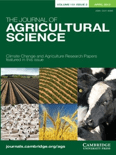
JOURNAL OF AGRICULTURAL SCIENCE
Nurturing Excellence in Agricultural ScholarshipJOURNAL OF AGRICULTURAL SCIENCE, published by Cambridge University Press, stands as a pivotal resource in the field of agricultural research. With a rich history dating back to 1905, this esteemed journal has consistently delivered cutting-edge scholarly articles that address pressing issues in agronomy, crop science, animal science, and genetics. Currently holding a Q2 ranking in Agronomy and Crop Science and Animal Science and Zoology, and a Q3 in Genetics, it reflects a robust impact within the academic community, contributing to innovative practices and technologies in agriculture. Indexed in Scopus, its authors benefit from broad visibility, supported by a strong readership among researchers, professionals, and students alike. While the journal does not currently offer open access, its rigorous peer-review process ensures that published works meet the highest scholarly standards, fostering a rich environment for knowledge exchange and advancement in agricultural science.

REVISTA DE LA FACULTAD DE CIENCIAS AGRARIAS
Advancing Sustainable Agriculture through Innovative Research.REVISTA DE LA FACULTAD DE CIENCIAS AGRARIAS is an esteemed academic journal published by UNIV NACIONAL CUYO, FAC CIENCIAS AGRARIAS, located in Chacras de Coria, Mendoza, Argentina. As a pivotal publication in the fields of Agronomy and Plant Science, it has achieved a commendable Q2 ranking in both categories, indicating its relevance and impact within the scientific community. Since its establishment as an Open Access journal in 2007, it has facilitated the dissemination of crucial research, fostering collaboration and innovation among researchers, professionals, and students alike. The journal's converged years from 2008 to 2024 allow it to present contemporary advancements and discussions related to agricultural practices and plant sciences. With a strong commitment to quality and accessibility, REVISTA DE LA FACULTAD DE CIENCIAS AGRARIAS provides a valuable platform for those engaged in the crucial exploration of sustainable agricultural methodologies and plant innovations.

International Journal of Plant Production
Connecting researchers to cultivate the future of plant science.International Journal of Plant Production, published by SPRINGER in Switzerland, serves as a leading platform for the dissemination of innovative research in the fields of Agronomy, Crop Science, and Plant Science. With an ISSN of 1735-6814 and an E-ISSN of 1735-8043, this journal has maintained its reputation by achieving a Q2 quartile ranking in both categories as of 2023, alongside notable Scopus rankings placing it in the top quartiles of its fields (Rank #105/516 and Rank #88/406, respectively). The journal's scope encompasses a wide array of topics vital to sustainable agriculture and plant production systems, making it a critical resource for researchers, professionals, and students striving for advancements in these disciplines. By fostering open scientific dialogue and supporting cutting-edge research, the International Journal of Plant Production is committed to contributing to the resolution of global food security challenges, enhancing agricultural practices, and promoting ecological sustainability.

Romanian Agricultural Research
Advancing Agricultural Science for a Sustainable FutureRomanian Agricultural Research is a prominent academic journal dedicated to advancing the field of agricultural science with a specific focus on agronomy and crop management. Published by the NATL AGRICULTURAL RESEARCH & DEVELOPMENT INST in Romania, this journal has established itself as an important resource within its discipline, evidenced by its Q3 ranking in the Agronomy and Crop Science category for 2023. With its ongoing publication since 2008, the journal provides a platform for researchers and professionals to disseminate their findings and share innovative practices that address the challenges faced in agricultural development. Although it operates under a non-open access model, Romanian Agricultural Research commits to rigorous peer-review processes, ensuring the high-quality content that enhances the academic community’s knowledge base. The journal's objective is to foster dialogues surrounding sustainable agriculture, improve crop yield, and contribute to the enhancement of agricultural practices globally. Researchers, professionals, and students will find this journal to be an invaluable repository of knowledge and a catalyst for future agricultural innovations.

Egyptian Journal of Agronomy
Fostering Growth in Agricultural Research and InnovationEgyptian Journal of Agronomy, published by the NATL INFORMATION DOCUMENTATION CENT, ACAD SCIENTIFIC RESEARCH & TECHNOLOGY, serves as a pivotal platform for researchers, professionals, and students focusing on various disciplines within the agricultural sciences, including agronomy, soil science, horticulture, and ecology. With an ISSN of 0379-3575 and E-ISSN of 2357-0288, the journal aims to bridge the gap in knowledge and innovation in the field with its comprehensive studies and frameworks. While the journal is currently categorized in low Scopus ranks, indicating immense potential for growth in influence and impact, it remains dedicated to providing quality research and fostering advancements in agronomic practices. Set in Egypt, a hub for agricultural research, the journal is committed to reflecting the regional and global challenges in agriculture. The Egyptian Journal of Agronomy is a vital resource for anyone engaged in the evolving landscape of agricultural science, offering insights that promote sustainable practices and address current issues facing the sector.

PAKISTAN JOURNAL OF AGRICULTURAL SCIENCES
Empowering Agricultural Scholars with Vital InsightsWelcome to the Pakistan Journal of Agricultural Sciences, a prominent platform for disseminating vital research findings in the fields of agronomy, crop science, food science, plant science, and soil science. Published by the prestigious University of Agriculture in Faisalabad, this journal aims to enhance the scientific discourse surrounding agricultural innovation and sustainability in Pakistan and beyond. With an ISSN of 0552-9034 and E-ISSN of 2076-0906, the journal serves as a valuable resource for researchers, professionals, and students interested in cutting-edge agricultural developments. As of 2023, the journal is ranked in the Q3 category for Agronomy and Crop Science as well as Food Science and positioned in Q4 for Plant and Soil Science, highlighting its growing impact within a competitive academic landscape. While the Pakistan Journal of Agricultural Sciences is not currently open access, it provides a comprehensive archive of research converging from 2011 to 2024, ensuring that critical knowledge remains accessible to those striving to advance the agricultural sciences. Join us in our mission to foster innovation and support sustainable practices in agriculture.
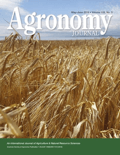
AGRONOMY JOURNAL
Advancing Sustainable Agriculture Through Innovative ResearchThe Agronomy Journal, published by Wiley, is a leading platform for cutting-edge research in the field of agronomy and crop science. Established in the United States, this prestigious journal carries the ISSN 0002-1962 and E-ISSN 1435-0645, with its coverage spanning from 1976 to 2024, showcasing a wealth of knowledge over decades. The journal is recognized in the top quartile (Q1) of its category, making it a highly respected source for quality literature, ranking #108 out of 406 in the Scopus database and reflecting a 73rd percentile standing in agricultural and biological sciences. While it operates under traditional access options, its commitment to disseminating valuable scientific inquiry aligns with the objectives of advancing sustainable agricultural practices globally. The Agronomy Journal serves as an indispensable resource for researchers, professionals, and students eager to stay abreast of significant advancements and discussions influencing the future of crop science and agronomic research.
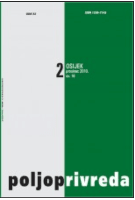
Poljoprivreda
Elevating agricultural practices with cutting-edge research.Poljoprivreda is a distinguished open-access journal dedicated to the field of agronomy and crop science, published by the FAC Agriculture Osijek in Croatia. Since its inception in 2000, the journal has been committed to disseminating high-quality research that informs both academic and practical advancements in agriculture. With an ISSN of 1330-7142 and an E-ISSN of 1848-8080, Poljoprivreda provides a vital platform for researchers, professionals, and students to engage with the latest findings and methodologies in agronomy, contributing significantly to the enhancement of agricultural practices in Croatia and beyond. Although currently ranked in the 22nd percentile within its category according to Scopus, the journal aspires to elevate its standing by welcoming innovative research that addresses contemporary challenges within the agricultural sciences. By fostering open access since 2000, Poljoprivreda ensures that its scholarly content is freely available, promoting wider dissemination and collaborative opportunities among researchers globally.

Agricultural Science and Practice
Empowering innovation in farming practices.Agricultural Science and Practice is a pivotal journal dedicated to advancing knowledge and research in the field of agricultural sciences. Published by the NATIONAL ACADEMY OF AGRARIAN SCIENCES OF UKRAINE, this journal serves as a vital resource for researchers, professionals, and students engaged in agriculture, agronomy, and related disciplines. The journal aims to disseminate high-quality, peer-reviewed articles that address contemporary issues, innovative practices, and advancements in agricultural methodologies. While currently specified as non-open access, the journal endeavors to contribute significantly to the global agricultural knowledge pool while fostering a collaborative research environment. With its base in Kyiv, Ukraine, Agricultural Science and Practice plays an essential role in highlighting regional agricultural challenges and solutions, thereby attracting a diverse readership that aspires to enhance food security and sustainable farming practices worldwide.
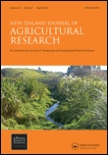
NEW ZEALAND JOURNAL OF AGRICULTURAL RESEARCH
Connecting Researchers to Drive Agricultural ExcellenceNEW ZEALAND JOURNAL OF AGRICULTURAL RESEARCH is a prestigious, peer-reviewed journal published by Taylor & Francis Ltd that has been at the forefront of agricultural science since its inception in 1958. With a strong focus on the fields of Agronomy and Crop Science, Animal Science and Zoology, Plant Science, and Soil Science, this journal has established itself in the academic community, achieving a notable Q2 ranking in various agricultural categories as of 2023. The journal thrives on its commitment to disseminating cutting-edge research and innovative practices that address contemporary challenges in agriculture. Although it does not currently offer an open access option, its valuable contributions can be accessed through various academic platforms, ensuring that vital research reaches a wide audience of researchers, professionals, and students globally. The journal's continued relevance and authority are reflected in its strong Scopus rankings, further emphasizing its role as a critical journal within the agricultural sciences.